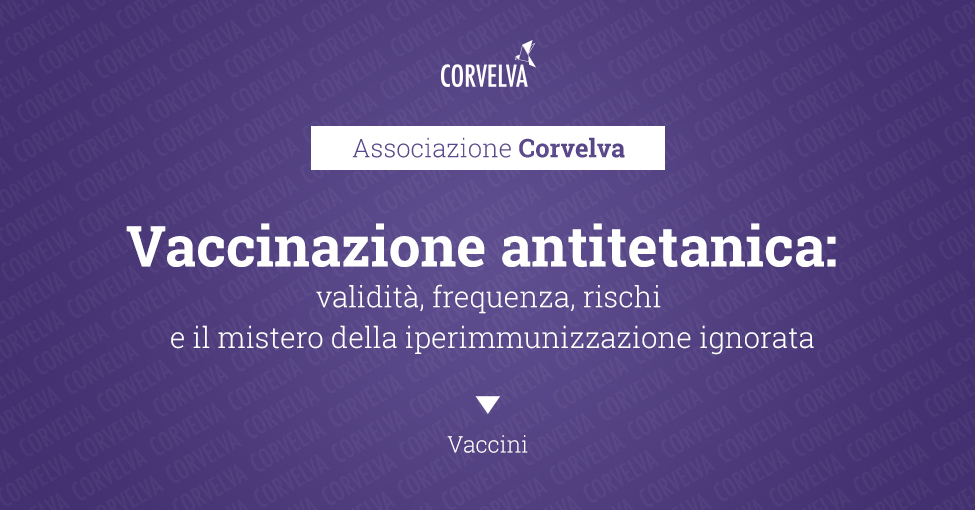Tetanus vaccination: validity, frequency, risks and the mystery of ignored hyperimmunization

The Ulss22 of the Veneto, in 2003, admitted the following, in black and white in the titled document "Tetanus immunoprophylaxis - analysis of the legislation and indications from the scientific literature".1
"Attention is now focused, in the light of a careful risk / benefit assessment, on the need or not to perform the recalls and, if necessary, with what frequency. The international literature is in fact highlighting that the subjects who performed the decennial recalls they would not seem to be more protected than those who have correctly performed only the primary course of 3 doses. (...) The literature consulted highlights the very long-lasting protection ensured by the basic primary cycle. However, this protection is not always correlated with the antibody titre: indeed even at antibody titers lower than 0,01 IU / ml (the so-called protective level) there is evidence of efficacy in vaccinated subjects "
But perhaps the most interesting part is the paragraph dedicated to "unavoidable cases"that we quote:
"There are, however, some very rare reports of cases (...) occurring in hyperimmunized people. The reasons for these vaccine failures are unclear (many things are not clear to us in fact, but when in doubt we vaccinate at spiano); possible hypotheses indicate an excess of toxin concentration (? uncontrolled vaccines?), an antigenic differentiation between tetanus toxin and vaccine toxoid (perhaps accentuated by the fact that this toxoid is revealed - for example in our recent chemical analyzes - inextricably linked to aluminum and as such, linked, it presents itself to the body in a decidedly different way from the original tetanus toxin ???) and a selective suppression mechanism of the immune response (again, many things apparently are not clear to us, what do we know about this possible selective suppression? what do we really know about how our immune system works?)
In addition, we read: ADVERSE REACTIONS:
"In the face of a good protection guaranteed by vaccinations, regardless of whether or not they have carried out the recalls, the disadvantages of the same are known (!!!), represented by the appearance, albeit rarely, of adverse reactions such as brachial neuritis, syndromes of Guillan Barrè and severe allergic reactions, and it should also be noted that the frequency of adverse events to vaccination is also related to the number of doses already administered. (!!!) The frequency of these reactions, although very low, is probably not justifiable in the face of the scarce or perhaps zero benefits that the execution of the ten-year calls (let alone closer, ed) leads.
In light of this, more than thorough explanations about how they could authorize the administration of 6 doses of tetanus to children aged <7 who must recover the vaccination plan to comply with Law 119/17 but have already completed the basic cycle of tetanus only. Such as? With what new evidence (that are evidence) scientific?
Ministry circular on the recovery of defaulters (15 January 2018):
"Subjects already immunized for tetanus - Vaccinate as per table 1 as if the subject had not been vaccinated - It is necessary to repeat the anti-tetanus vaccination because there are no suitable formulations without the tetanic component"
In order to justify this increased schedule, the operating circular of the Veneto (to put links) cites a document of the CDC: https://www.cdc.gov/mmwr/preview/mmwrhtml/00041645.htm
Circular from Veneto: cit. 3. Up to 6 doses of any vaccine containing tetanus toxoid can be administered by the age of XNUMX (https://www.cdc.gov/mmwr/preview/mmwrhtml/00041645.htm); for this reason, in the case of two or three doses performed with the tetanus toxoid alone, it is possible to start a new cycle of primary immunization with a vaccine containing tetanus and diphtheria to recover vaccination against diphtheria (present only in combination with tetanus);
However, I find no trace of this aspect in the CDC link shown. if anyone understands which indication they refer to, please report it. Instead we read:
Tetanus toxoid should be administered with diphtheria toxoid as Td every 10 years. If a dose is given first as part of wound management, the next booster is not needed until 10 years later. (See Tetanus Prophylaxis in Wound Management). More frequent repeaters are not indicated and may lead to an increase in the frequency and severity of adverse reactions. One means of ensuring that people receive boosters every 10 years is to routinely vaccinate them in mid-life, i.e. 15 years, 25 years, 35 years, etc.
And also in many other sites and official links of asl / ussl we find the same indications that inadvisable to start again cycles and / or to make closer calls! For example:
"NB The cycle of three basic doses must never be restarted even if 10-20-30 years have passed. Hyperimmunization due to improper use of the vaccine can lead to the onset of generalized reactions due to the formation of circulating immune complexes. Peripheral neuropathies have been described in hyperimmunized subjects in association with tetanus vaccination. (http://www.asl13.novara.it/intranet/Territorio/Dipartimen/SISP---Ser/Le-Vaccina/Profilassi-tetano.pdf)"
Why are 3 other inoculars containing tetanus booster given to children who have already undergone a primary tetanus cycle? Where did the risk of hyperimmunization go? What scientific evidence is there for the (sudden) harmlessness of this practice? Suddenly, since a law has been made that makes other vaccines compulsory to go to kindergarten, is it also permissible to make 6 inoculations in a few years?
References:

